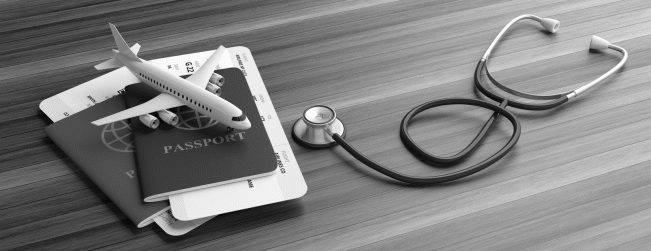Archives
Stay up-to-date and on top of your health with our e-Newsletter and receive updates on current treatments and vital health issues.
TRAVEL HEALTH: It’s not just about the Immunisations

With the holiday season fast approaching, the time to prioritise your travel health is now.
BEFORE YOU LEAVE
Arrange a travel health appointment no later than 6-8 weeks prior to departure to allow time to complete any vaccination schedules that may be required. Information detailing your holiday itinerary, duration, activities, level of accommodation, as well as your past medical history, all help to determine your risk of exposure to travel illness and recommended preventative measures prior to and during your travel. This may include, travel immunisations, medications, over the counter supplies, as well as addressing any precautions specific to your current medical conditions to ensure you are able to make the most out of your upcoming adventure.
TRAVEL INSURANCE – It is highly recommended that you take out travel insurance prior to departure that adequately covers you in the event of illness.
WHILE YOU ARE AWAY
FOOD + DRINK – Following the dictum “Boil it, Peel it, Cook it or forget it!” is the best way to avoid food related illness when travelling. Uncooked vegetables, raw meat, unpasteurised dairy products and food served at room temperature are common sources of pathogens that can cause traveller’s diarrhoea and other food-borne illnesses. Drinking bottled or boiled water and avoiding ice also helps to prevent water-borne diseases.
DVT PREVENTION – A Deep Vein Thrombosis (DVT) is the development of a blood clot in a deep vein, most commonly occurring below the knee. The clot can extend upwards and if a segment of the clot, known as an embolus, breaks away and travels to the heart and lungs, this can be fatal. Long periods of immobilisation such as long-haul flights or bus journeys increase the risk of developing a DVT. Standing up, moving around the cabin and stretching one’s legs at regular intervals is recommended to reduce the risk of a DVT. So too is avoiding alcohol, keeping well hydrated and wearing compression stockings throughout long haul journeys. There are various factors that can increase one’s DVT risk such as family history, certain medications and pre-existing illnesses. Consult your doctor about your individual risk of a DVT and preventative measures that may be appropriate for you, which in some cases includes the taking of preventative medication.
MOSQUITO-BORNE DISEASE PREVENTION –whilst malaria, dengue fever and yellow fever are unrelated illnesses, they do have one thing in common: they share the same mode of transmission via mosquitos. Vaccination or medication may be required where the risk of illness is deemed significant.
Important additional measures for preventing these diseases is to minimise mosquito bites by using DEET or picaridin containing mosquito repellent, wearing light colour long-sleeved clothing, avoiding perfume or cologne and using a mosquito net at night.
UPON YOU RETURN
If you are feeling unwell or experiencing any fevers within 2 weeks of returning from a holiday you should always see your doctor, even if you were completely well throughout your trip. Some infections take time to incubate before causing symptoms and it is important to identify ad treat infections as early as possible.
Being a fully accredited travel clinic, Airlie Women’s clinic can attend to all your travel health needs to ensure you enjoy a safe and healthy holiday. From all the staff at Airlie Women’s Clinic, we wish you a bon voyage and happy, healthy adventures!